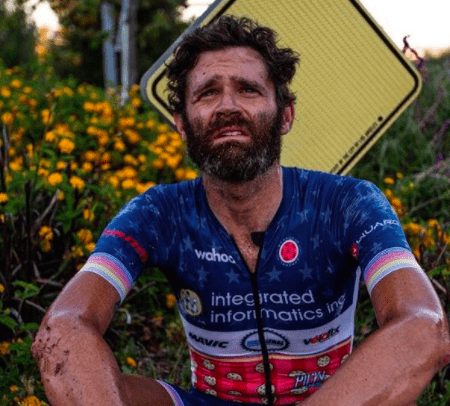Why everyone is ‘Everesting’ during the lockdown
The painful cycling trend that has rapidly caught on while races are cancelled
 Photo by:
photo: Phil Gaimon/Instagram
Photo by:
photo: Phil Gaimon/Instagram
It started off with just a few training feats. Robert Gesink did seven hours on the trainer, local cyclists started doing ‘the Über Pretzel‘ on Zwift, triathletes Sam Long and Lionel Sanders battled for the Mt. Lemmon KOM.
Suddenly the lockdown events were getting more frequent. Crush Covid, a 24 hour marathon bike ride run by Canadian team Toronto Hustle, exploded in size and raised more than $200,000. During the 24 hour event, Travis Samuel, a member of the Toronto Hustle team, broke the world record for farthest virtual distance ridden in 24 hours.
RELATED: How Travis Samuel broke a world record and got through 24 hours on the trainer
Most of these events have some form of charitable component. In April, Geraint Thomas raised more than £375,400 for NHS charities with his three 12 hour days on the trainer.
Wow, just broke through the £350,000 barrier. Makes still being numb worth it ??? #GsNHSZwiftShiftshttps://t.co/V4yNaiULZY
— Geraint Thomas (@GeraintThomas86) April 19, 2020
Everybody is Everesting
Then came the ‘Everesting’. The idea is straightforward, ride 8,848 vertical metres (the height of Mt. Everest) in one ride. Riders pick one hill and do dizzying numbers of repeats until they reach almost 9,000 metres of elevation. The concept has been around since the 90s, but the number of “officially confirmed” successful Everestings has doubled this year alone.
View this post on Instagram
May 1, WorldTour riders Mark Cavendish and Luke Rowe gained some attention for Everesting virtually in 10:37:32. On May 11, Phil Gaimon, known for his ‘Worst Retirement Ever‘ cycling antics, broke the world record for fastest Everesting at 7:52:12 riding the steep Mountaingate Drive climb just outside of Beverly Hills.
RELATED: Phil Gaimon sets new ‘Everesting’ world record and raises $73,000 for No Kid Hungry
Gaimon held the record for only four days before, on May 15, U.S. national cross-country mtb champion Keegan Swenson, 26, rode 29 repeats of the Pine Canyon Road climb in Utah’s Wasatch Mountain State Park for a new record Everesting of 7:40:05.
View this post on Instagram
Everyone was everesting. Almost 90 pros and dedicated cyclists made Everesting attempts and raised $130, 000 for COVID-19 relief the weekend of May 25 for the Giddy Up for Good challenge. Meanwhile, the women’s Eversting record switched hands three times in two weeks. First, Boels Dolmans’ Katie Hall rode the Bonny Doon ascent outside of Santa Cruz, California 27 times in 10 hours and one minute. Then, one week later, former pro Lauren De Crescenzo, who had just finished a 60-day COVID-19 emergency response deployment, Everested in 9:57:29. Four days later De Crescenzo’s time was beat by Hannah Rhodes, who now holds the overall Everesting record, male or female, for the United Kingdom.
Why are they doing it?
In a way, Everesting is the perfect social isolation event. It’s a solo effort and Gaimon notes that it’s a great way to challenge yourself while staying close to home. “I think it’s an endurance challenge that racers need,” he says. “It’s hard to simulate a racing effort for high end intensity, so this makes up for it with time and hills.”
Katrina Waldhauser, a cyclist and PhD candidate at UBC’s Psychology of Exercise, Health, and Physical Activity lab, says that the popularity of these events during lockdown likely relates to goal setting and motivation. “In general, research has supported the notion that effective goal setting can improve motivation,” says Waldhauser. “In other words, staying focused and motivated is directly linked to clear, foreseeable future goals. With virtually all upcoming races being cancelled, this has meant that goals athletes were working towards may no longer be relevant. Initially, this may have led to some decreases or plateau in motivation. Now that the initial shock has worn off, athletes have shifted to ‘recalibrate’ or adjust their goals, replacing former race-related goals with alternative challenges.”
The climate of uncertainty at this time may also contribute to the need for a sense of control. “As humans, we like to have a sense of control over our environment—which COVID-19 has made much more difficult,” says Waldhauser “For some athletes, shifting their goals to something such as Everesting may provide a renewed sense of direction and control (not to mention structure through training), while trying to stay afloat in a world of uncertainty.”
“I’m not entirely sure why this ‘extreme’ type of goal has been so popular, but perhaps in part, it has to do with countering the feelings of extreme uncertainty in this global crisis.”
With regular racing still on hold, the Everesting attempts will likely keep coming. Canadian Cory Wallace will be attempting an Everest on the real Mt.Everest this week. You can also watch out for a record attempt on Saturday June 13, when Ascent Cycling’s Jeremy Rae will attempt to break the Canadian Everesting record riding up Hamilton’s Sydenham road. According to Everesting.cc, the current record is held by Albertan Ailsa MacDonald, who is the 2017 50K and 100 mile running Canadian National Champion and 2018 Ironman Canada winner. MacDonald Everested in 12 hours 37 minutes . Rae’s team is encouraging others to take on their own climbing challenge, and suggests riders donate to an organization of their choice every time they complete the climb.
